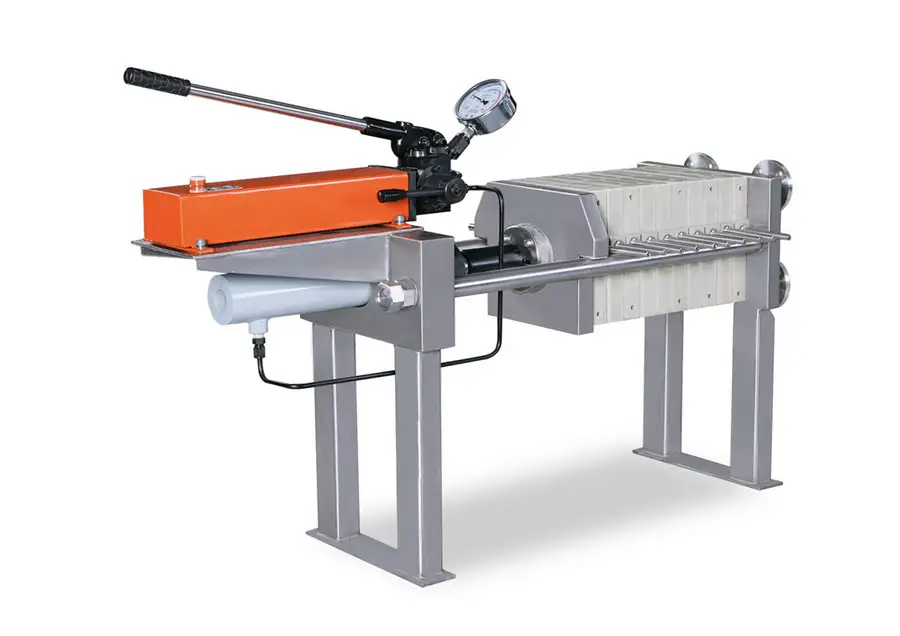
Model 250 Manual Filter Press
| Place of Origin: | Shandong, China |
|---|---|
| Brand Name: | JINGJIN |
| Warranty: | 12 months |
For customized product solutions, please reach out to us!
Your satisfaction is our commitment!
Jingjin will always be your trusted partner!

Quick Details
Supply Ability
Supply Ability:10000 Set/Sets per Year
Packaging & Delivery
Packaging Details:Seaworthy packing
Port: Tianjin , Qingdao
Lead Time:15days from prepayment
Founded in 1998, Jingjin Environmental Protection Inc. is a comprehensive service provider in the environmental protection industry, specializing in the production of filtration equipment, offering complete filtration technology solutions, and managing environmental protection projects from conception to operation. As a vice-president unit of the China Environmental Protection Industry Association, Jingjin plays a pivotal role as the primary drafter of national standards for filter presses and filter plates. For twelve consecutive years, Jingjin has maintained the largest production capacity and sales volume of filter presses globally, with products reaching 123 countries and regions. The Jingjin trademark has been recognized as a ‘Famous Chinese Trademark’ by the State Administration for Industry and Commerce of China and is protected under the Madrid International Trademark Registration. Water Jiang, the chairman of Jingjin, has been honored as a National Labor Model and National Model Worker.
Jingjin is committed to advancing energy conservation and environmental protection, offering consumers cost-effective products and high-quality professional services. To meet stringent filtration requirements, Jingjin has introduced a complete set of German filter cloth production lines and technology. With 27 years of filtration experience, Jingjin employs heavy German rapier looms to weave the finest silk threads into high-density filter cloths with various hole patterns, applying a beating-up force of 0.3-3.5 tons after each weft crosses the warp. This results in Jingjin filter cloths having 50% more filtration holes than other filter cloths of the same area, significantly enhancing filtration speed. The filter cloth is woven under controlled temperature and humidity conditions, eliminating fabric burrs caused by static electricity.
Most importantly, the monofilament filter cloth enables automatic detachment of filter cakes, solving a long-standing challenge in the industry.
In pursuit of its vision for China, Jingjin strives to become the most influential comprehensive service provider in the global environmental protection arena. Guided by its mission of “Protecting the Environment and Beautifying China” and its green strategy of “Turning sewage into pure water and sludge into resources,” Jingjin offers profound solutions for ecological protection and economic development, ensuring clean water and blue skies for future generations.
Technical Advantage
The Jingjin frame is constructed from Q345B material, which boasts a tensile strength 1.4 times greater than that of Q235. This enhancement ensures that the Jingjin filter press operates with increased safety and stability. The oil cylinder seat, pressing plate, and thrust plate are crafted using carbon dioxide shielded welding, ensuring robust construction.
The main beam of the Jingjin filter press features a welded box design and is produced using advanced submerged arc automatic welding technology. For optimal durability, all spare parts requiring painting undergo high-speed centrifugal ball blast descaling and iron scale removal. Following this, a MIO epoxy build primer is applied, and an acrylic polyurethane coating is directly added to ensure superior adhesion. This process not only eliminates the need for hundreds of tons of putty annually, thereby reducing costs and benefiting the environment, but also significantly enhances the paint’s adhesion and the filter press’s anti-corrosion properties.
Model 250 Manual Filter Press Features
1.Capacity: The “250” in the model number typically indicates the capacity of the filter press, which could refer to the size of the plates, the total volume of slurry it can process per cycle, or the total filtration area. Without further details, we can assume it’s a mid-range model designed for moderate-volume filtration applications.
2.Manual Operation: Since it is specified as a manual filter press, it would require manual operation to open and close the press and to remove the filtered cake after each cycle.
3.Filtration Area: The filtration area would be around 250 square meters or a similar capacity, depending on the exact design and plate size. The filtration area is crucial for determining the throughput and efficiency of the press.
4.Plate Size: The size of the individual filter plates would likely be around 250 mm x 250 mm or a similar dimension, although the actual size could vary based on the manufacturer’s specifications.
5.Maximum Pressure: Manual filter presses typically operate at lower pressures than automatic or hydraulic presses. The maximum operating pressure would depend on the design but is commonly around 1 to 2 bar (or 14.5 to 29 psi).
6.Materials of Construction: The materials used for the plates and frame would be chosen based on the application and the type of slurry being processed. Common materials include polypropylene, stainless steel, and other corrosion-resistant alloys.
7.Ease of Use: While manual operation requires physical effort, the simplicity of the design makes them relatively easy to use and maintain.

If you are interested in our products, please contact us !
